Cash flow is king (and the other factors driving returns over the next decade)
Interest rates have hit an inflection point, and as many investors know, are on the rise as soon as early this year, with widespread ramifications for share markets from here on in.
In a webinar on Wednesday, Epoch Investment Partners' John Tobin, portfolio manager of Epoch’s Equity Shareholder Yield strategies, said that "the PE expansion surge that has been driving equities is likely over."
Instead, companies with a history of generating growing cash flows and dividends are likely to drive the majority of returns over the coming decade, having suffered during a period of artificially low interest rates over the past two years.
The key, moving forward, is duration. And having spent 20 years at Credit Suisse as a senior research analyst on its high yield bond team, Tobin thoroughly believes investors should now be using the same principles when investing in equities.
"Bond investors know, in a rising interest rate environment, the thing to do is to shorten duration. And our argument is that equity investors need to be thinking along similar lines," Tobin said.
In this wire, I'll summarise some of the key points from Epoch's latest webinar, including why dividend stocks with solid cash flows are likely to provide "salvation" for investors over the next decade.
Interest rate hikes are unavoidable
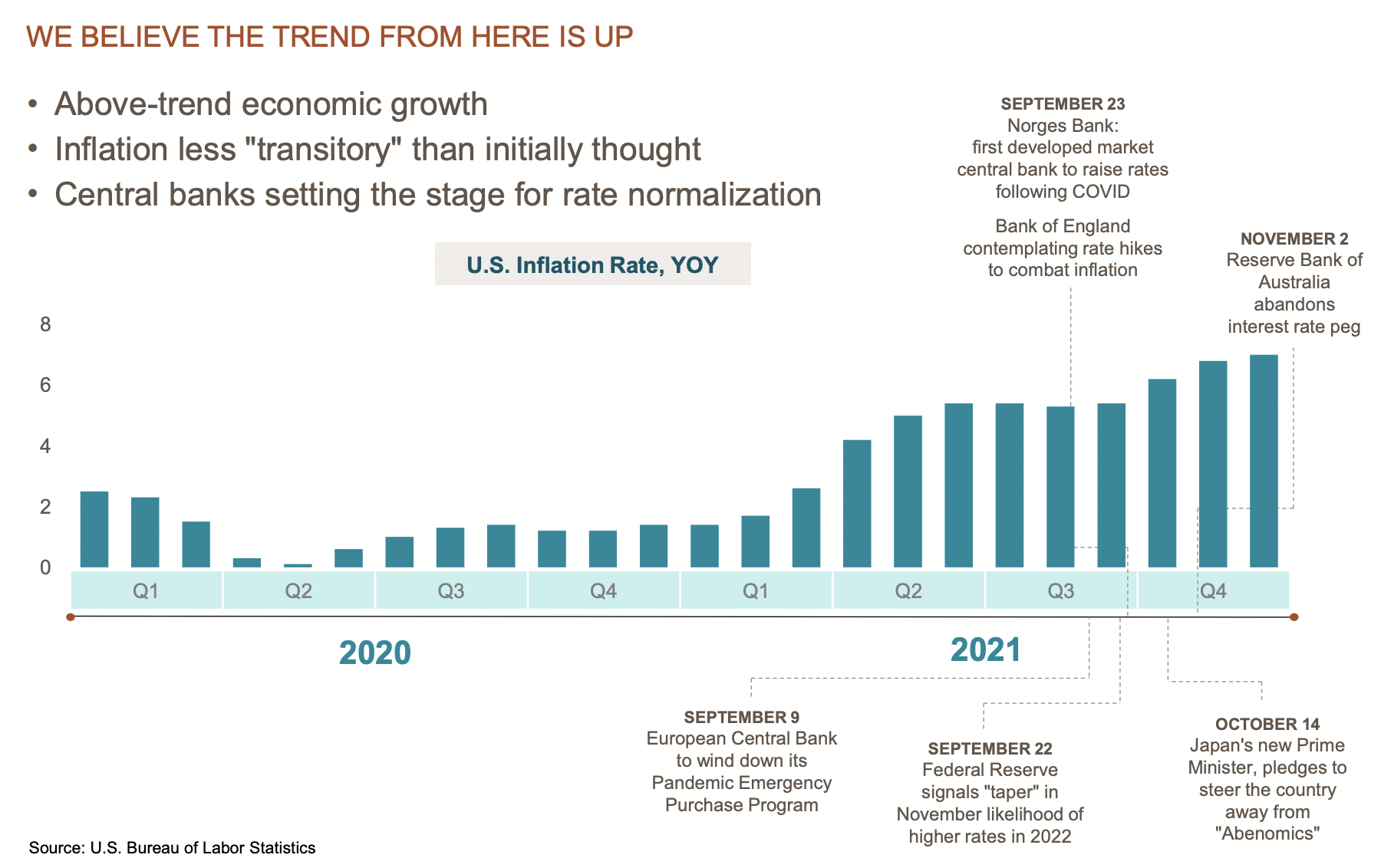
We are currently seeing above-trend economic growth around the world, Tobin said, with Bloomberg consensus figures showing that global GDP growth is set to lift by 4.3% for 2022 and 3.6% for 2023. In the US, growth is predicted to lift by 3.7% and 2.5%, respectively.
"Those are above-trend growth figures. If the world is going to grow by over 4% this year, and the US economy by almost 4%, that's considerably above long-term trend growth for both the global economy and the US economy," he said.
"Even as we see growth slowing, keep in mind, this is above-trend growth that we're experiencing."
While inflation was initially thought to be all but a transitory concern, now the consensus is far less optimistic, Tobin added, with central banks now starting to look at inflation with a "greater sense of urgency".
"We've seen the Bank of England raise interest rates twice, the Federal Reserve in the United States has given us guidance that they expect to start raising rates in March, with at least three interest rate increases in March. And the market, as you know, is contemplating five, six, or maybe even seven rate increases in the US in 2022," he said.
"The Bank of Canada has told us, they're likely to start raising rates in March, the European Central Bank has recently become less dovish, and is even talking about the possibility of raising rates sometime this year. So all around the world, we see central banks thinking about inflation with a greater sense of urgency and starting to adjust policy accordingly.
"This picture that emerges is one where it's hard to escape the conclusion that interest rates are likely to be moving up from here."
The bond market is responding accordingly, Tobin added. And while US Treasuries have been on the rise since September, German Treasuries are now above zero for the first time in over two years.
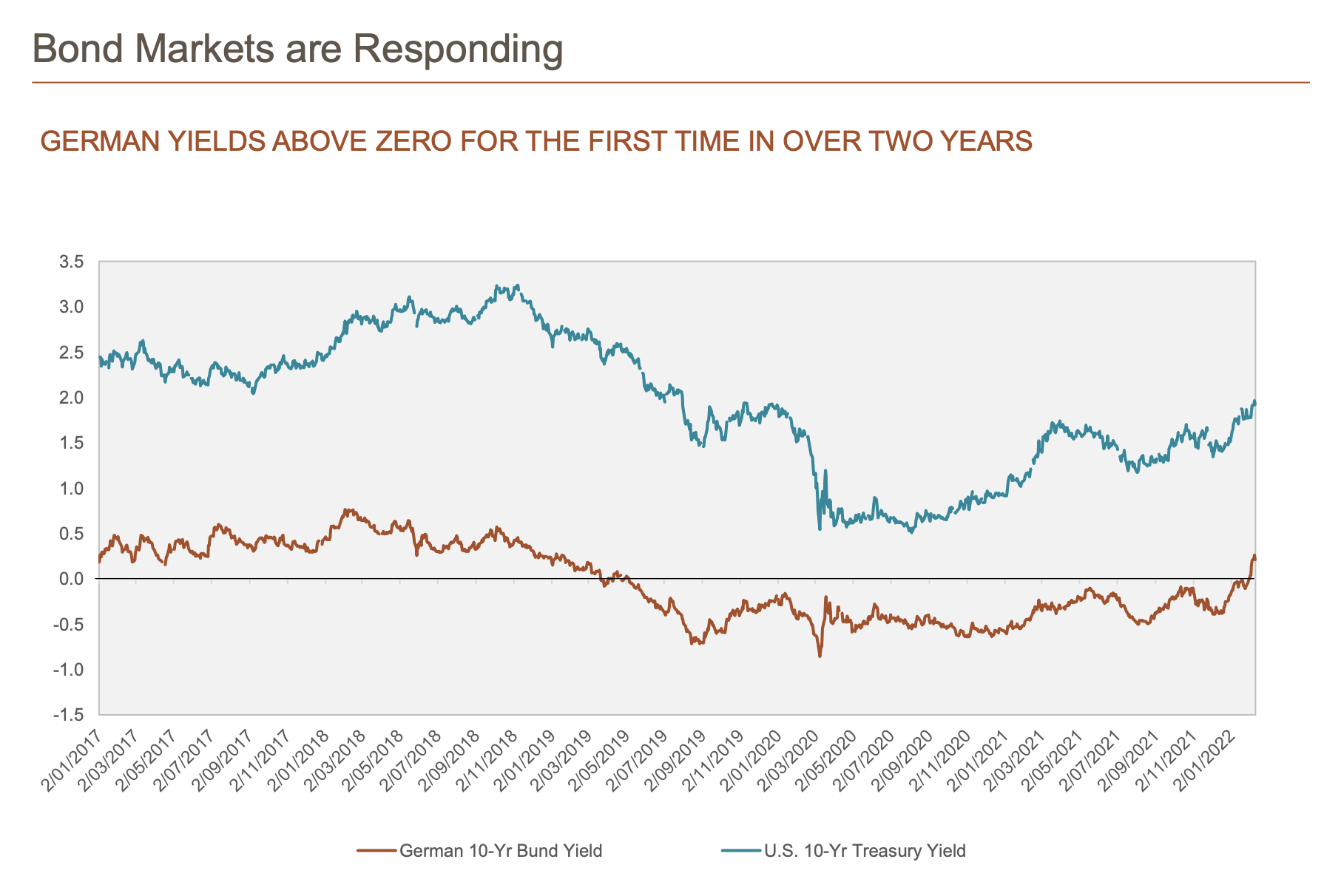
So what does this mean for stocks?
The key for investors is duration, Tobin said, a concept that is familiar to fixed income investors but more foreign to those who invest in stocks.
"It's all about understanding when cash flows occur," he said.
"Are they occurring in the near future or in the distant future? (It is about) recognising that money has a time value and the value of $1 to be received 10 years from now is not the same as the value of $1 to be received today or next year."
He defines long-duration versus short-duration stocks as per below:
Long duration: Stocks that may not be generating free cash flows currently, but are expected to see a ramp-up in financial metrics (revenue, earnings, cash flow) in the future. I.e. growth stocks.
Short duration: Stocks that have already been generating cash flows and are paying growing dividends today.
"Bond investors know, in a rising interest rate environment, the thing to do is to shorten duration. And our argument is that equity investors need to be thinking along similar lines," Tobin said.
"They need to be thinking about the risk in their portfolios from holding long-duration equities in a rising rate environment, especially long-duration equities that have experienced significant price appreciation and multiple expansion in the past year or two."
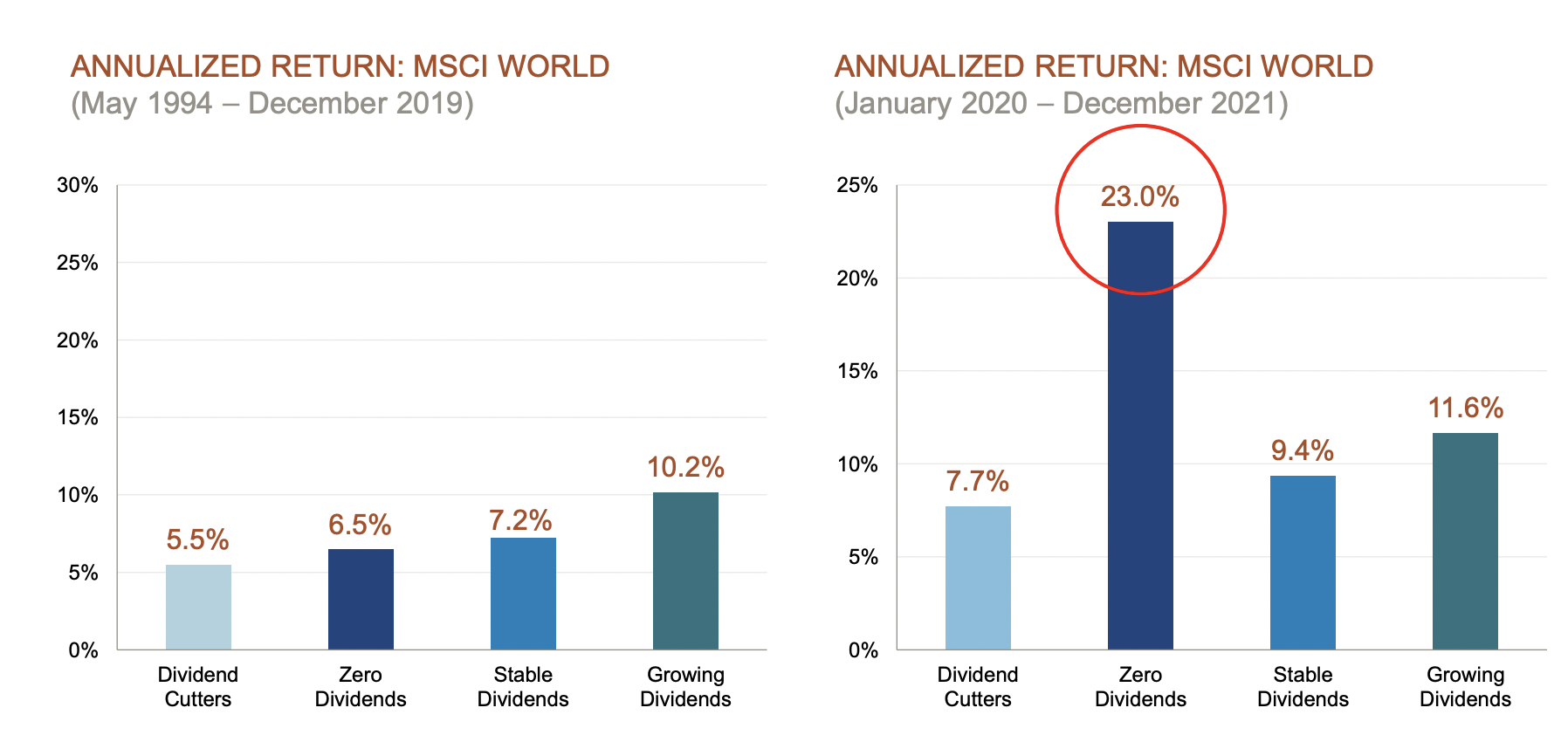
Shorter duration stocks were the hardest hit at the beginning of the pandemic, as COVID-19 was perceived to be a short term disruption, he said. This is why growth stocks outperformed, as their earnings were less likely to be impacted in the future.
And while stocks that paid growing or stable dividends have outperformed over the past 25 years, stocks that paid zero dividends were the companies that have outperformed since the onset of the pandemic, Tobin added.
"Our argument is long-duration stocks are going to face stronger headwinds when rates rise," he said.
"The math is straightforward and irrefutable. It says that for a given increase in interest rates, the impact on present value is greater for cash flows in the distant future. And that's foundational as we think about duration as a concept and the application that it has to equities in the current environment."
Why Value and Quality investors may finally be rewarded
While investing in companies with growing cash flows and sound capital allocation practices may not have been fashionable in 2020 and 2021, the market environment is finally changing, Tobin said.
"Investing in companies that have a history of growing cash flow, investing in companies that have demonstrated behaviour around sound capital allocation practices and policies... It's been out of favour," he said.
"And so the salvation part of our argument is the market environment is changing."
Evidence shows that the high dividend yield factor actually has historically outperformed on average during periods when the three month Treasury Bill yield was rising, he said.
"Perhaps for many that's surprising and counterintuitive, as we tend to think dividend stocks are probably going to get hurt by rising rates. The evidence suggests the opposite," Tobin said.
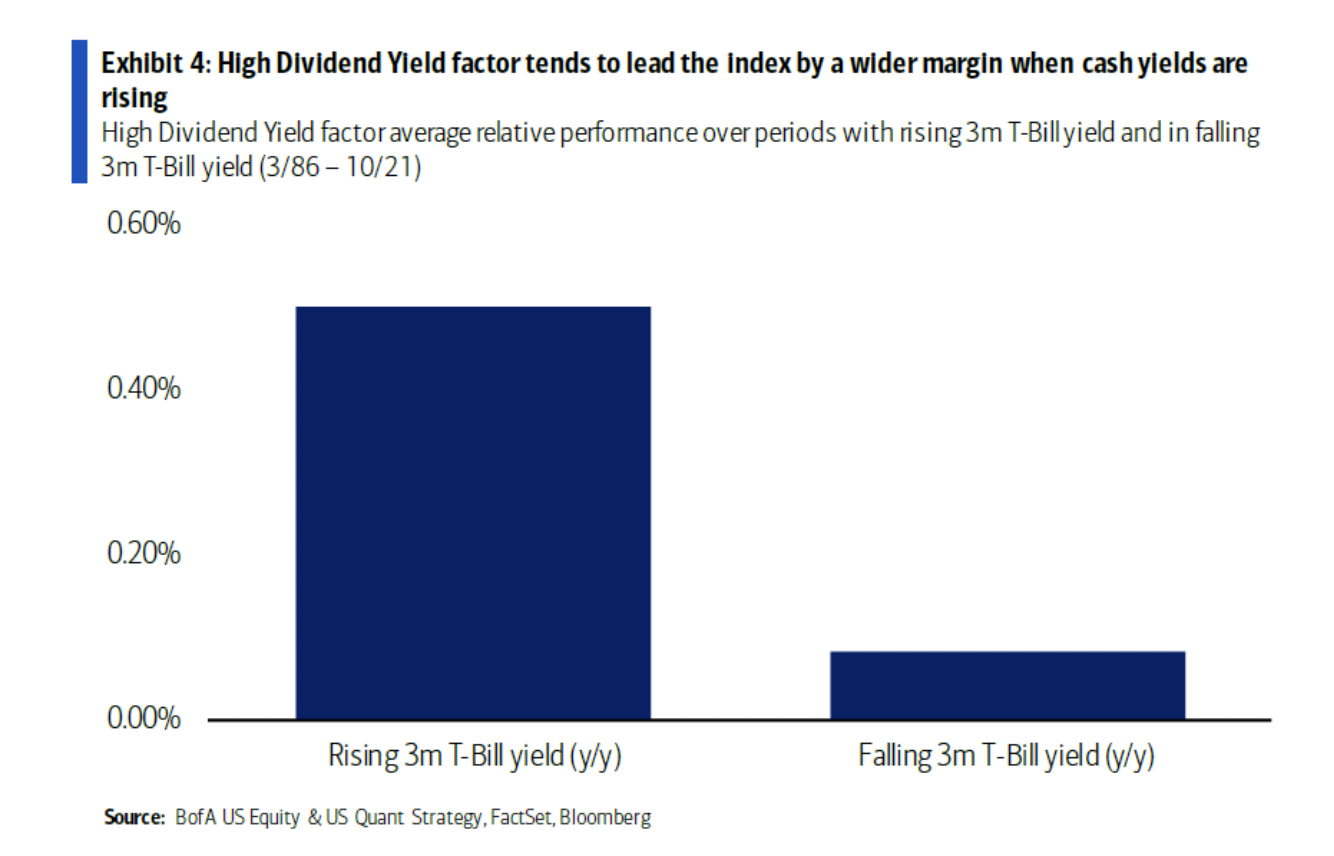
In this way, shorter duration equities, or companies generating cash flow and paying dividends are likely to be less impacted by an increase in the interest rate than those companies with high PE multiples, Tobin said.
"The idea is that yield is an advantage when rates are going up, and a disadvantage when they're going down," he said.
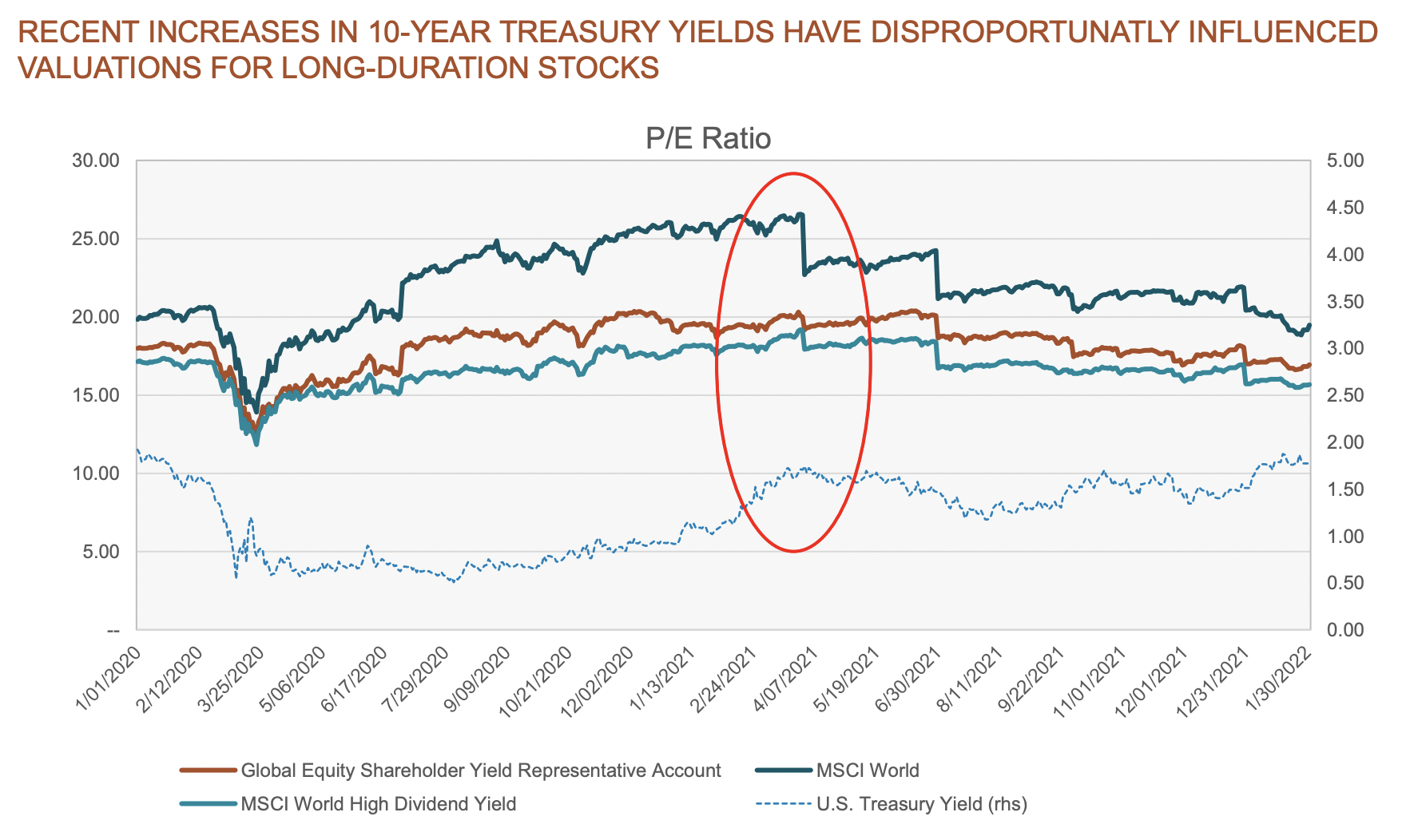
Tobin is therefore focused on building a portfolio of high-quality equities; stocks that:
- Have a history of generating growing cash flows.
- Have a history of allocating capital appropriately - meaning, paying shareholders an attractive growing dividend and demonstrating the ability to invest to earn a return above a company's cost of capital.
- For companies that have publically raised debt, this credit should have an investment-grade debt rating.
"The point we're trying to make here, as we look at the interest rate trajectory going forward around the global economy, suggests to us that the PE expansion surge that has been driving equities is likely over," Tobin added.
As we shift towards this new market environment, the stocks that are likely to generate the majority of returns are likely to revert back to the norm, he said.
"Bank of America's valuation model suggests that the next 10 year period will be one where price return is likely to be slightly negative," Tobin said.
"Over a long period of time, dividends have contributed about 40% of the total return historically for equity investors, as opposed to price return. They are suggesting that over the next 10 year period, dividends could be even more important as a driver of return for equity investors."
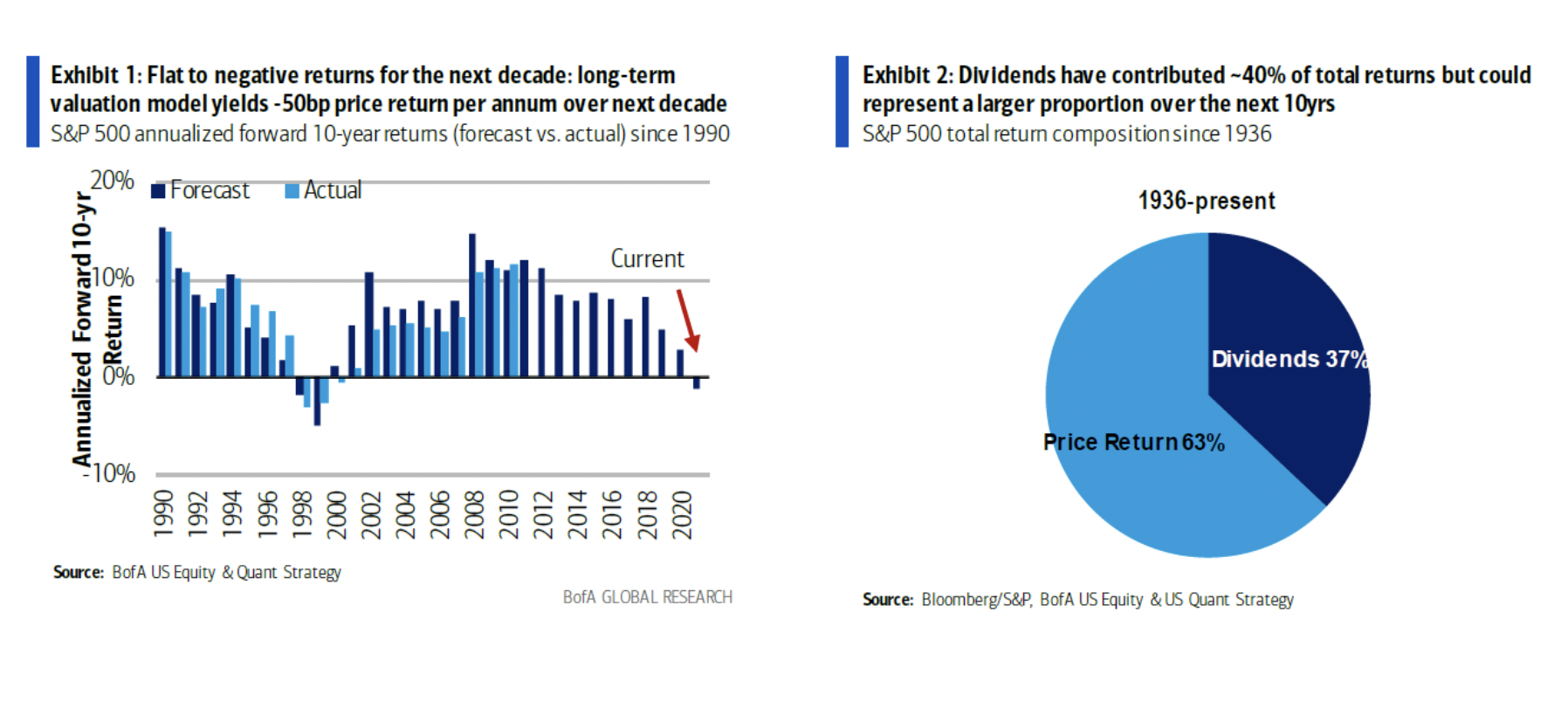
While PE multiples are likely to wax and wane over time, leaving the long-term drivers of returns to earnings and dividends, which are almost always positive, Tobin added.
"We see significant opportunities to harvest shareholder yield - companies are very liquid, they have a tremendous amount of cash. US companies have $7 trillion in corporate liquid assets, cash and short term investments," he said.
"So when we asked, 'Will companies have the ability to continue to make attractive distributions, pay dividends, grow dividends, use excess cash to buy back stock and/or pay down debt?' This would suggest that they very much have the capacity to do that."
Seek superior total and risk-adjusted returns
Epoch’s Global Equity Shareholder Yield investment strategy is simple, straightforward and based on sound principles: invest in a diversified portfolio of high-quality companies that have a track record of generating growing levels of free cash flow while simultaneously rewarding shareholders with a progressive dividend. The architecture of the strategy makes sense, and it works. Find out more.

4 topics
1 fund mentioned
1 contributor mentioned

